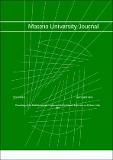| dc.contributor.author | George M Onyango, Lillian A Omondi | |
| dc.date.accessioned | 2020-11-24T11:48:02Z | |
| dc.date.available | 2020-11-24T11:48:02Z | |
| dc.date.issued | 2014-06-30 | |
| dc.identifier.uri | https://repository.maseno.ac.ke/handle/123456789/2960 | |
| dc.description.abstract | This paper looks at the role of village elites in a rapidly changing rural landscape. The
process of development in Kenya has seen the rise of a dichotomous community in which
salaried employees spend their working life in the urban areas and on retirement move to the
rural areas. There are also a large number of civil servants, teachers and religious leaders
employed and based in the rural areas. These two sets of people have significant control of
how development interventions operate in the rural communities. The result is that often
their aspiration may not represent the bulk of the community. To achieve the broad goals of
Kenya Vision 2030, there is an urgent need to effectively utilize the resources like
manpower, skilled and unskilled, available in the country. These village elites form a critical
element of skilled labor in rural development. The paper aims at assessing the roles of the
different categories of elites in the rural communities, examining their capacity to influence
the development agenda and the impact of this role in effectiveness of development
interventions. The paper highlights challenges that development agencies need to address
with regards to village elites community as they endeavor to maximize the contribution of
these elites to effectively enhance rural development. | en_US |
| dc.publisher | Maseno University | en_US |
| dc.subject | Village Elites, Social Capital, Community Development | en_US |
| dc.title | Village Elites and Community Development in Kenya | en_US |
| dc.type | Article | en_US |

